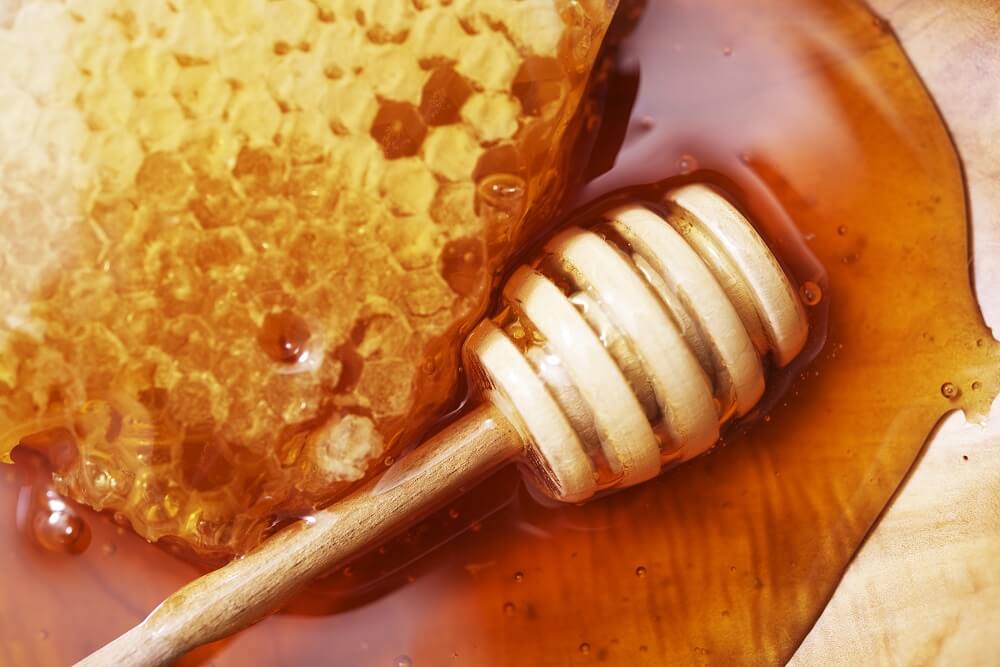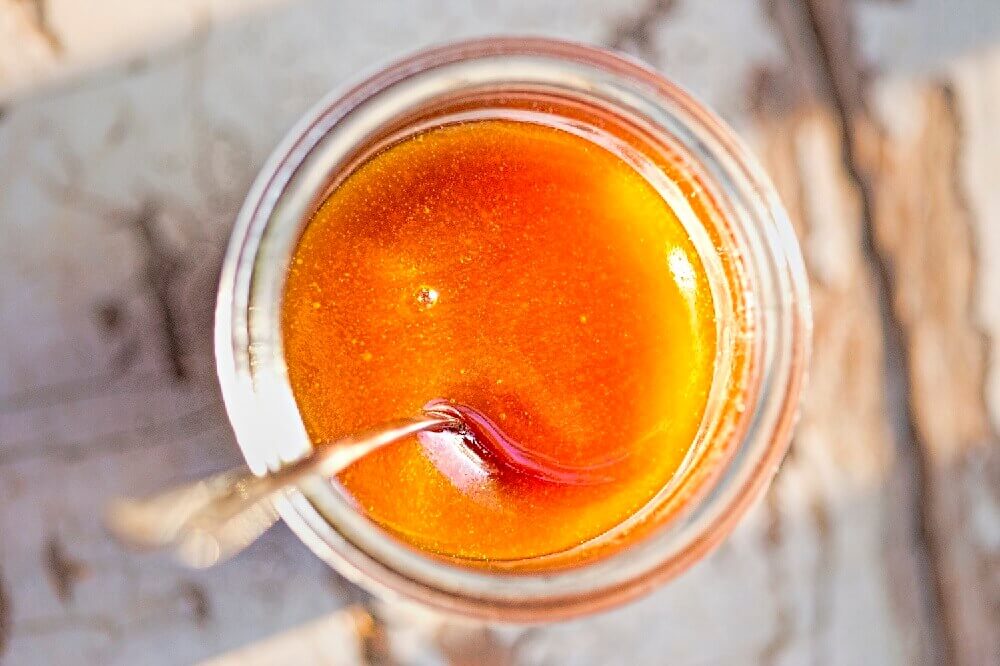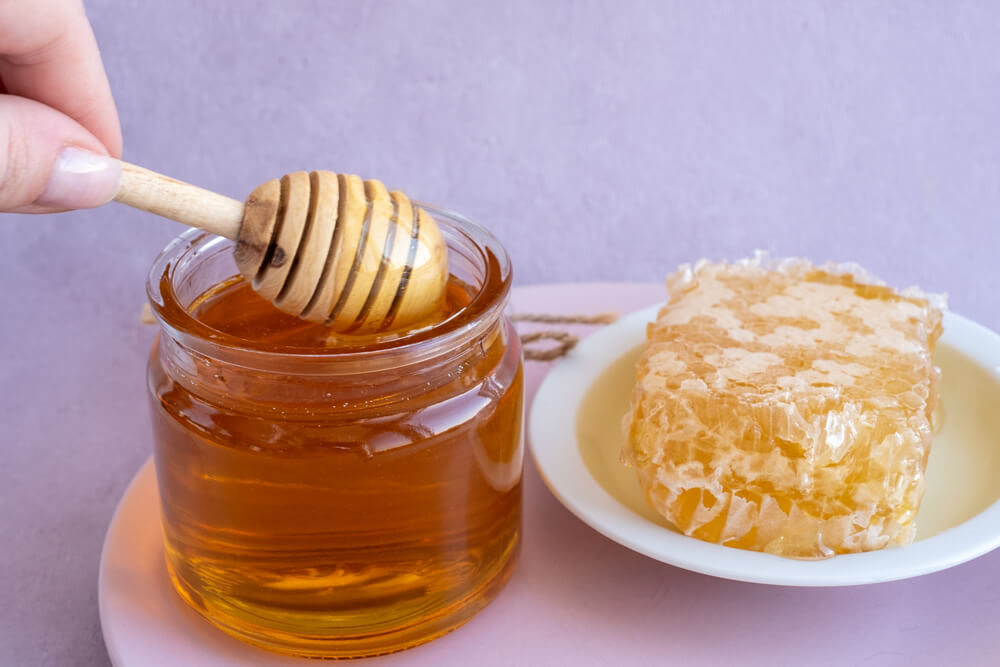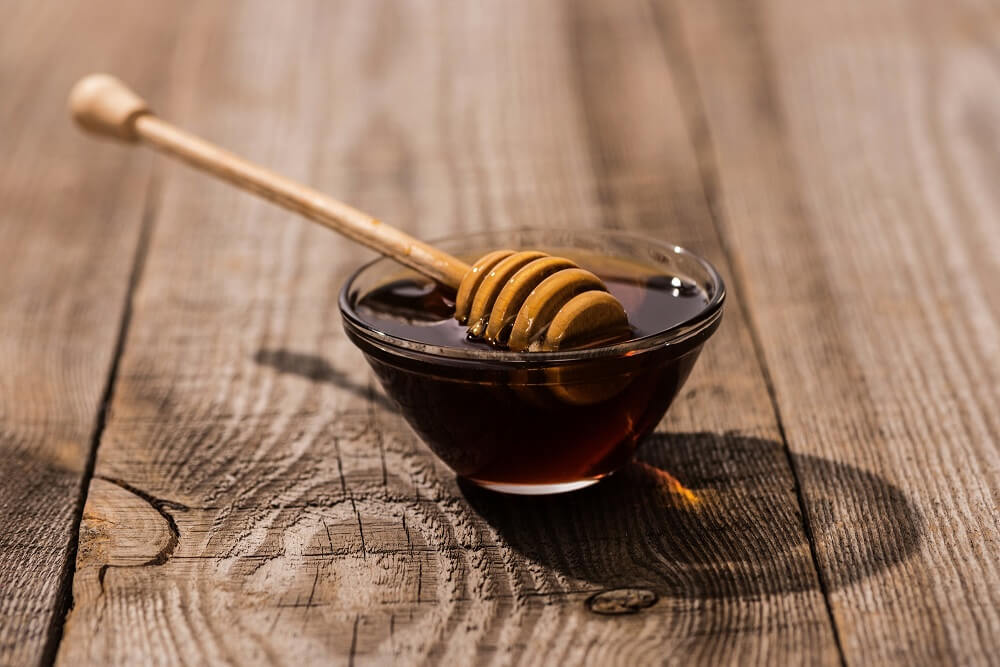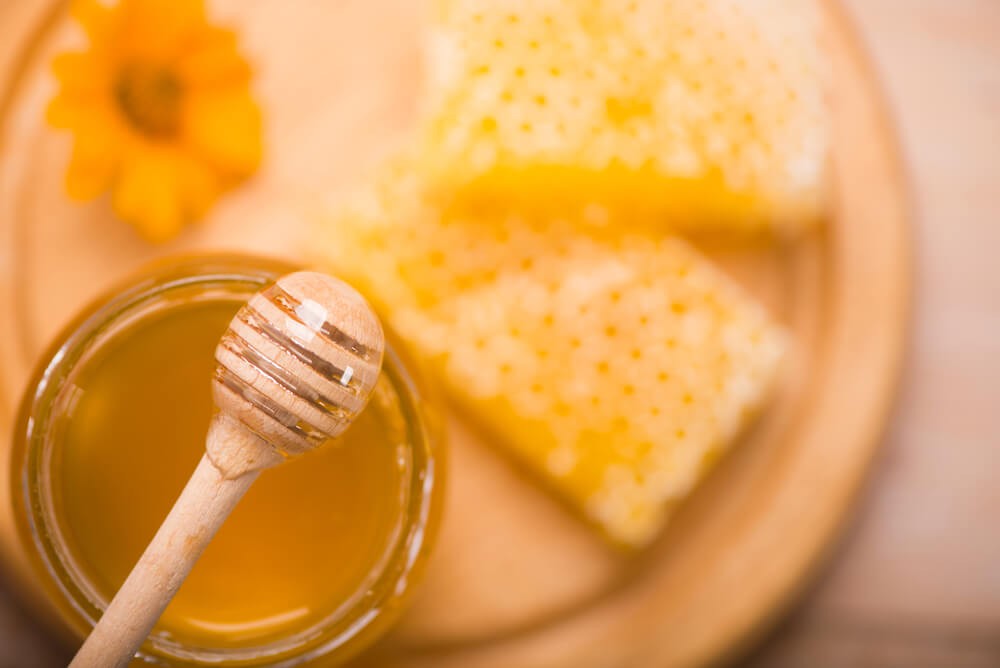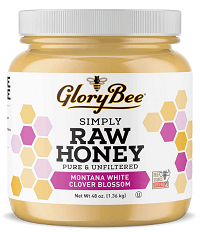Table of Contents:
Fermented Honey With Ginger
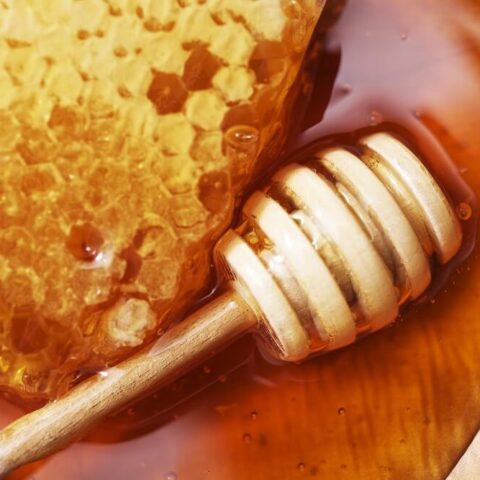
How to make fermented ginger with honey - a delicious treat with health benefits thanks to its antibacterial, antifungal, and antiviral properties.
Ingredients
- 1 cup ginger
- 1 cup raw honey
Instructions
Step 1: Cut the ginger
- Peel and cut the fresh ginger root because this will help speed up fermentation.
- Transfer the peeled and cut ginger to a sterilized glass jar with an airtight lid.
Step 2: Pour the honey over the ginger and let it ferment
- Fill the jar with honey, gently mix the honey and ginger, and close it with an airtight lid.
- Once closed, turn the jar upside down (this is why a good seal is key) and place it aside. Put a plate underneath the jar, just in case there is leakage.
- You’ll need to ‘burp’ the honey with ginger daily for 14 days. You can do this by unscrewing the lid, which allows any build-up of CO2 gases to escape. Then close the lid and shake the jar, turn it upside down again, and put it aside to continue fermenting.
- Move fast while burping the ginger honey because you don't want to allow too much oxygen to get into the honey, which can disrupt fermentation. Just a quick unscrewing of the lid will be enough to release the gases.
- After 14 days, the fermented ginger honey is ready to eat. For an even better taste, wait a month or longer so the ginger can have more time to ferment.
How Do I Store Honey With Ginger?

Honey with ginger can last for months if stored properly.
Place the jar in a cool, dark location – like a kitchen pantry or cabinet. As long as you have an airtight jar that doesn’t allow any moisture, the ginger with honey will last you a while.
Remember:
The honey and ginger may darken over time or even develop a greenish-blue tinge – this is a normal process.
Also, here are a few things to keep in mind:
- Always allow for space between the honey and lid. Some jars of fermented ginger and honey will foam up more than others, causing overspill. That’s why leaving a bit of headspace at the top of the jar is crucial.
- The longer the fermentation timeframe, the better. You can start eating the ginger honey after two weeks, but it’ll taste even better if you wait 4-6 weeks. And if you can wait even longer – such as three months – you’ll be in for a delicious surprise.
- Use a 1:1 ratio of honey and ginger. There should be plenty of honey to submerge the ginger, but not too much to where you smother the ginger. This is where the 1:1 ratio applies. If you overfill with honey, it will prevent the ginger from releasing its juices which are important to the fermentation process. If you want to use more honey than a 1:1 ratio, then also add some water to help with the fermentation.
- Use fermenting weights. Fermentation weights are used to hold down your ginger during fermentation. This way, your ginger stays covered by the honey.
- Try self-burping jars. You can use self-burping jars or buy jars with ferment lids or other airlock lids. Just remember to shake the jar to keep the ginger submerged.
What Are the Benefits of Honey With Ginger?
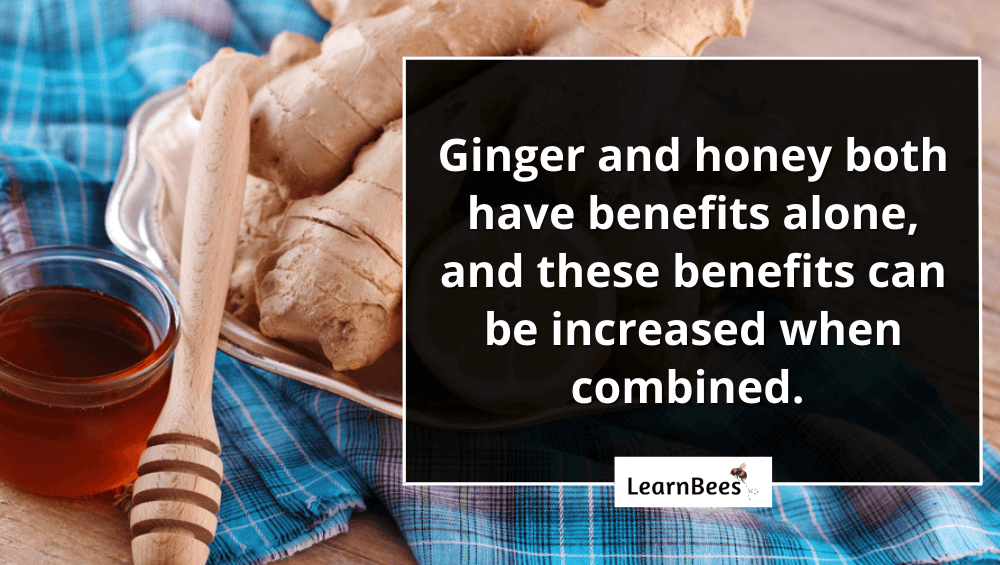
Benefit 1: It May Help Lower Cholesterol Levels
Both ginger and honey have been shown to help reduce cholesterol.
One study of 60 people showed that ginger reduced LDL (bad) cholesterol levels by 17.4% over three months.(1)
Another study showed that individuals taking 3 grams of ginger powder daily saw a 10% reduction in their LDL (bad) cholesterol levels over 45 days.(2)
As a result of evidence found in both animals and humans, ginger has significantly improved total cholesterol, LDL cholesterol, and blood triglyceride levels.
Honey has also been shown to reduce LDL (bad) cholesterol levels while raising HDL (good) cholesterol. In one study, 70 young men who were fed honey daily for four weeks noticed a decrease in bad cholesterol and an increase in good cholesterol.(3)
Benefit 2: It Can Benefit Brain Function
Chronic inflammation and oxidative stress can accelerate the aging process. They’re also thought to be among the fundamental causes of Alzheimer’s disease and age-related cognitive issues.
Some animal studies show that ginger’s bioactive compounds and antioxidants can inhibit inflammatory responses in the brain.(4)
There’s also some research that ginger can help improve brain function directly. In a study of healthy middle-aged women, daily ingestion of ginger extract boosted working memory and reaction time.(5)
Additionally, several animal studies show that ginger can help fight against age-related decline in brain function.(6, 7, 8)
Honey also offers potential memory and brain benefits, thanks to its high antioxidant content. These antioxidants can help your immune system, decrease illness, and protect your brain from diseases like Alzheimer’s and dementia.
Benefit 3: It Can Reduce the Risk of Infection
Both ginger and honey have been shown to inhibit the growth of many types of bacteria.
According to one study, ginger is very effective against the oral bacteria linked to periodontitis and gingivitis. These are both inflammatory gum diseases.(9)
Ginger may also be beneficial for preventing the respiratory syncytial virus (RSV), a common cause of respiratory infections.(10)
Honey dates back to ancient times as one of the oldest known antibiotics. Many people are surprised to learn that honey contains hydrogen peroxide, which is responsible for some of its antibacterial properties.(11)
Honey also contains a lot of sugars, which can help inhibit the growth of certain bacteria.
Additionally, honey has a low pH level. This draws moisture away from bacteria, causing the bacteria to die off due to dehydration.
Benefit 4: It May Help Relieve Nausea
One review indicates that ginger can help relieve morning sickness and alleviate nausea after cancer treatments.(12)
One study showed that doses of 0.5 and 1.0 grams of ginger were effective at reducing nausea in 576 adult cancer patients.(13)
Ginger has also been shown to relieve vomiting and nausea in people undergoing surgery. However, it seems to be the most effective concerning pregnancy-related nausea, also known as morning sickness.
Ginger is considered safe for most adults. With that said, it’s recommended that pregnant women avoid ginger if they’re close to giving birth or have had miscarriages.(14)
FAQs on Honey With Ginger
- Is ginger and honey good together?
- What is honey and ginger good for?
- Can we soak ginger in honey?
- When should I take ginger and honey?
- When should you not take ginger with honey?
- What happens if you drink ginger with honey every day?
- What does honey with ginger cure in the body?
- Does ginger and honey reduce weight?
- How long does ginger in honey last?
- Can ginger and honey cure coughs?
- What are the ginger with honey side effects?
Is ginger and honey good together?
Yes, ginger and honey is a good combination. Honey has antibacterial and anti-inflammatory properties, while ginger can help relieve nausea and vomiting. Additionally, ginger and honey may help improve brain function and reduce the risk of infection.
Many people also love the unique taste that ginger and honey offer when combined. If you’re looking for a new way to enjoy honey, try adding some ginger to it. Honey has a sweet flavor, while ginger has a spicy kick, making for a delicious and interesting combination.
—> Go back to the FAQs on honey with ginger
More to Explore:
- Honey Pasteurization: Does it Ruin Raw Honey?
- Honey for Skin Benefits: Directions, Uses, & Risks
- 8 Scientific Benefits of Raw Honey
What is honey and ginger good for?
Honey and ginger both offer a variety of health benefits. When combined, they may help improve brain function, reduce the risk of infection, and relieve nausea and vomiting. Plus, the unique taste of honey and ginger is enjoyable for many people.
—> Go back to the FAQs on honey with ginger
More to Explore:
Can we soak ginger in honey?
Yes, soaking ginger in honey is what you do during fermentation. This combination helps to create a delicious and healthy condiment. The fermentation process can take up to two weeks, so be patient.
If you want to wait longer than two weeks, some recommend soaking the ginger in honey for up to three months. This will create a robust taste and delicious treat.
You can also mix ginger and honey while cooking. This will help to create a unique flavor for your dish.
—> Go back to the FAQs on honey with ginger
More to Explore:
When should I take ginger and honey?
You can take ginger and honey anytime you want. However, many people find it a great way to start their day or before bedtime.
For example, both ginger and honey have antibacterial properties. This means they can help fight off infections and reduce the risk of illnesses.
Additionally, honey has been shown to help relieve sore throats and coughs. So, if you’re feeling under the weather, ginger and honey may be a great way to help you feel better. It can also help you sleep better by coating the throat and alleviating pain.
—> Go back to the FAQs on honey with ginger
More to Explore:
When should you not take ginger with honey?
There are no known adverse side effects to taking ginger and honey. However, some people may be allergic to honey or ginger. If you’re allergic to either of these ingredients, avoiding taking them together is best.
Signs of an allergic reaction include:
- Hives
- Itching
- Swelling
- Redness
- Wheezing
- Difficulty breathing
If you experience these symptoms, stop taking ginger and honey and see a doctor immediately.
—> Go back to the FAQs on honey with ginger
More to Explore:
What happens if you drink ginger with honey every day?
Drinking ginger with honey every day can offer various health benefits. For example, it can help improve brain function, reduce the risk of infection, and relieve nausea and vomiting. Additionally, the unique taste of honey and ginger is enjoyable for many people.
Drinking ginger with honey every day is generally safe as long as you don’t experience adverse side effects such as an allergic reaction. However, it’s always smart to speak with a doctor before starting any new supplement or health regimen – especially if you have health conditions.
—> Go back to the FAQs on honey with ginger
More to Explore:
What does honey with ginger cure in the body?
Honey with ginger can offer a variety of health benefits. For example, it can help improve brain function, reduce the risk of infection, and relieve nausea and vomiting. Additionally, the unique taste of honey and ginger is pleasant as a morning treat or afternoon snack.
However, honey with ginger is not a cure-all and should not be used to replace necessary medical care. Speak with a doctor before using honey with ginger to treat severe health conditions.
—> Go back to the FAQs on honey with ginger
More to Explore:
- The Top 3 Best Manuka Honey Brands
- Orange Blossom Honey: Uses, Benefits, & Risks
- Sourwood Honey: Uses, Benefits, & Risks
Does ginger and honey reduce weight?
Honey hasn’t been shown to offer weightless benefits, but ginger has. This is because ginger contains compounds that may help reduce inflammation and control free radicals. Additionally, there has been some research suggesting that eating ginger can help you stay fuller longer – which may lead to eating fewer calories overall.
With that said, ginger is not a cure-all for weight loss. If you’re looking to lose weight, you’ll need to focus on eating a healthy diet and exercising regularly. However, including ginger in your diet may help support your weight loss goals.
—> Go back to the FAQs on honey with ginger
More to Explore:
How long does ginger in honey last?
If stored in an airtight container, it can last several months.
—> Go back to the FAQs on honey with ginger
More to Explore:
- The Brutally Honest Truth About Sour Honey
- Buckwheat Honey: Uses, Benefits, & Risks
- Can You Eat Honeycombs?
Can ginger and honey cure coughs?
Honey has been shown to help relieve sore throats and coughs. So, if you’re feeling under the weather, ginger and honey may be a great way to help you feel better. It can also help you sleep better at night by coating the throat and alleviating pain caused by sore throats.
—> Go back to the FAQs on honey with ginger
More to Explore:
What are the ginger with honey side effects?
Both ginger and honey are typically considered safe for most adults. However, some people may be allergic to honey or ginger. If you’re allergic to either of these ingredients, avoiding taking them together is best.
Furthermore, if you have a medical condition, such as diabetes, it’s best to talk to your doctor before making diet changes. This is because honey can affect blood sugar levels.
Plus, honey should not be fed to infants under 12 months because it can contain spores that can cause botulism.
